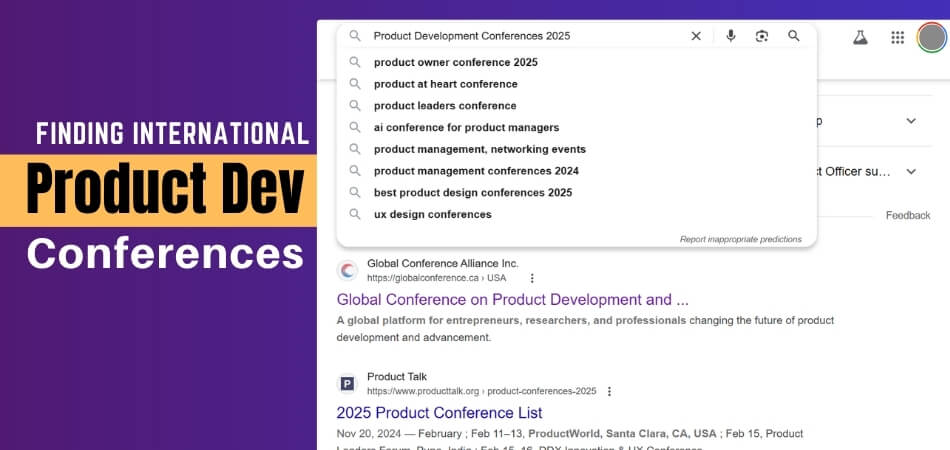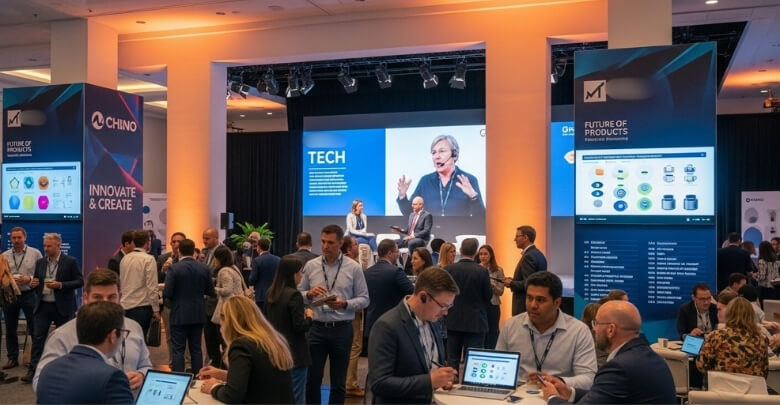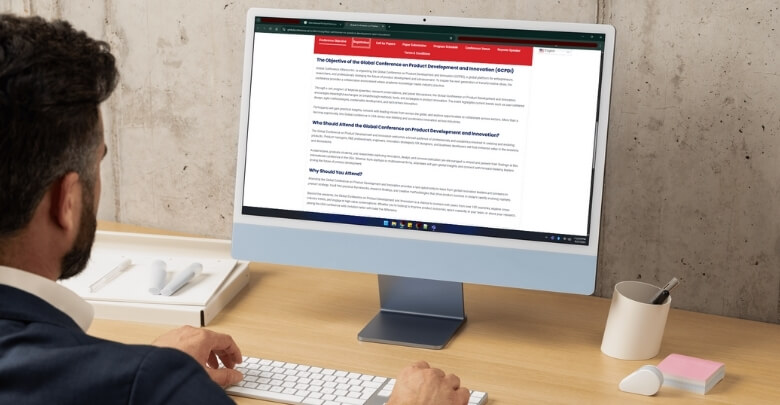Learning and growing in product development often means joining events where people share new ideas. Conferences are a great way to meet experts, hear about the latest trends, and connect with others from around the world. They can also inspire you with fresh ways of thinking.
So, how to find international product development conferences?
You can find international product development conferences by checking global conference directories, industry association websites, and academic event listings. Following universities, trade groups, and major companies in the field helps you discover upcoming conferences worldwide.
Use search engines, follow industry news, and explore virtual or in-person options to stay updated on global events. Keep reading to find out how to plan your next event.
How to Find International Product Development Conferences?
Attending international product development conferences is a great way to learn new ideas, meet professionals, and stay updated on trends. These events give you the chance to grow your skills and build connections. With so many conferences happening worldwide, knowing where to start can save you time and effort.

Step 1: Define Your Criteria
Begin by deciding what type of conference you want to attend. Think about the topics, location, and budget that matter most to you. Choosing clear goals will help you avoid wasting time on events that do not match your needs. When you know what you are looking for, your search becomes easier and more focused.
Step 2: Conduct an Online Search
Search engines are simple tools that can show you many upcoming events. Use keywords like “product development conference” along with the year or your preferred city. This approach helps you narrow down the most relevant results. Make sure to check more than one search result page to avoid missing good options.
Step 3: Explore Conference Directories
Conference directories list events happening in different regions. These sites often provide details such as speakers, dates, and registration fees. Browsing these directories can help you compare events side by side. Many professionals use them as a trusted starting point for event planning.
Step 4: Check Industry Associations
Industry associations like the PDMA or the Global Conference Alliance often publish lists of events. Their websites are reliable because they focus on conferences that matter to professionals in your field. For example, you may find events in countries such as the USA, Germany, or even upcoming conferences in Canada, along with other popular locations. This way, you can choose events in areas that work best for your schedule.
Step 5: Use Professional Networks
Professional networks such as LinkedIn can be powerful tools to find events. Many conference organizers share updates through company pages or posts. Joining groups that discuss product development can also give you direct information. Staying active in these spaces will help you spot opportunities quickly.
Step 6: Review Event Platforms
Event platforms like Eventbrite or Meetup often feature industry-specific gatherings. These platforms let you filter by date, city, or topic. They also allow you to see how many people are attending, which can show how popular an event is. Reading reviews or ratings can give you more confidence before registering.
Step 7: Evaluate and Verify
Always check the details before booking a ticket. Look at the past editions, speakers, and reviews to confirm the event’s quality. A reliable conference will have clear information about sessions and schedules. Taking time to verify saves you from spending money on low-value events.
Step 8: Sign Up for Alerts
Subscribing to newsletters or setting alerts can help you stay ahead. Many event websites let you sign up for updates on future conferences. This way, you won’t miss announcements about new opportunities. Alerts make it easier to plan early and secure better deals on tickets.
What Happens in a Product Development Conference?
Product development conferences bring together creative minds, industry leaders, and professionals from across the globe. These events mix learning, collaboration, and exposure to innovation. Each part of the program is designed to give value and fresh insights.
Keynote Presentations
- Industry experts share advanced strategies and real experiences, helping participants gain a deeper understanding of shifting product landscapes.
- Presentations highlight case studies and innovation trends, with speakers often addressing new technologies and their direct applications.
Panel Discussions
- Panels explore product growth, scaling MVPs, and MedTech with open conversations that encourage real-world practical learning.
- Attendees hear multiple viewpoints during these sessions, which allows balanced insights into industry challenges and possible solutions.
Hands-on Workshops
- Workshops focus on design thinking, market research, and user experience, providing participants with skills applicable to real work.
- Deep-learning sessions create space for interaction, ensuring participants practice strategies instead of only listening to lectures passively.
Hackathons and Prototyping
- Teams collaborate to solve product challenges creatively, moving through ideation, pitching, and product thinking without requiring coding.
- Hackathons encourage innovation by providing structured contests, where participants build confidence in problem-solving under pressure.
Networking Opportunities
- Events offer strong opportunities to meet thought leaders and peers, building connections that may lead to future collaborations.
- Conversations during breaks, receptions, or lounges help participants exchange experiences while also creating long-lasting professional friendships.
Exhibitions and Tech Expos
- Exhibitors showcase cutting-edge tools and product innovations, giving participants direct exposure to solutions transforming digital markets.
- Tech expos allow attendees to interact with demos, enabling better product understanding before adoption or organizational integration.
Special Sessions
- Fireside chats and live Q&A provide direct access to speakers, offering unfiltered insights about growth strategies and leadership.
- Strategic discussions highlight topics such as GTM strategy and stakeholder alignment, supporting effective organizational product development decisions.
What Role Does a Product Development Conference Play in Career Growth?
Conferences bring together people who share the same interests and goals in product development. These events create an environment where learning feels natural and exciting, not like a strict classroom. Participants meet professionals who have real experience and success stories to share. Let’s look at the main ways product development conferences can shape your career.
Skill Building
Workshops at these conferences give you a chance to practice and learn new techniques. You don’t just listen; you actually apply ideas in a hands-on way. This makes it easier to use those skills in your everyday work. Improving in small but steady ways builds confidence over time.
Networking
Conferences are also about meeting new people who care about the same things you do. You can connect with peers, mentors, or even future employers. A simple conversation can lead to opportunities that change your career path. These relationships often stay with you for years to come.
Fresh Ideas
Listening to experts share their thoughts opens your mind to different ways of solving problems. They often talk about current trends or upcoming technologies in product development. Learning these things helps you think beyond your daily work routine. New ideas often lead to smarter decisions and better results.
Career Visibility
Being at these conferences shows others that you are active and serious about your career. People notice when you ask questions, join discussions, or share your thoughts. This builds your personal image as someone engaged and knowledgeable. Over time, that visibility can create better career opportunities.
Motivation Boost
Hearing success stories and seeing new innovations can spark excitement about your own goals. Many people leave these events feeling more positive and confident. That kind of motivation is important when challenges feel overwhelming. It helps you keep going with fresh energy.
Finding Opportunities
One major advantage is discovering the right events that match your goals. For example, you can find the best product development conferences to attend by checking industry groups or professional platforms. The right conference can connect you with exactly the people and knowledge you need. Taking this step makes your career progress smoother and faster.
Types of Products Showcased in a Product Development Conference
Conferences are places where creativity meets real action through exciting product displays. Companies bring their ideas to life on stage. Visitors get a chance to see what is new and what is already successful. Every booth and session adds something valuable for curious minds.
New Products
These are the stars of most conferences because they show what’s coming next. Companies often use them to highlight their latest technology or designs. People attending love to see these firsthand because they represent fresh innovation. New products also help businesses prove they are keeping up with the competition.
Popular Products
Popular products are already successful in the market and known by many customers. Companies showcase them to remind people of their strong reputation. These items provide context for how new innovations fit into the bigger product line. It’s like showing the backbone of what already works well.
Product Variants
Variants are simply different versions of an existing product made for specific needs. They might change in design, size, or even features. This flexibility shows how companies adjust to customer demands in different regions. It also highlights the creativity involved in adapting older ideas into fresh forms.
Specialized Products
Specialized products focus on industries like healthcare, electronics, or software. They are designed to meet the unique needs of those fields. Conferences use these items to match the theme of the event. Attendees can see how companies target solutions for different groups of people.
Digital Products
Not everything at a conference is physical—software and apps are showcased too. These tools help companies display their digital ecosystem and support for modern industries. People enjoy seeing live demonstrations because they show real-world use. Digital products often connect directly with how businesses operate every day.
Prototype Products
Prototypes are early-stage ideas that may not be ready for the market yet. They spark interest because they show the future of product design. Companies often gather feedback from experts and customers during these showcases. This feedback helps them decide how to improve before launching.
How Should You Plan for Attending an International Conference?
Attending an international conference can be exciting, but proper planning makes the whole experience more rewarding. With so many sessions, speakers, and networking chances, preparation ensures you don’t miss out on opportunities. The steps below guide you toward making the most of every moment.
Research the Event
- Look closely at the agenda, speakers, and themes so you understand what matches your personal or professional goals.
- Explore past conference reviews online because they can reveal the quality of sessions, speakers, and networking opportunities.
- Check the venue layout early, since knowing the schedule and location helps reduce confusion during the actual event.
Define Your Goals
- Decide if your main focus will be networking, knowledge-building, or exploring career opportunities within your chosen field.
- Set at least two or three clear goals, giving you direction while choosing sessions and managing your time.
- Write these goals in a notebook, making them a daily reminder as you participate in conference activities.
Register and Budget
- Register early on the official portal to secure your spot, often saving money with early booking discounts.
- Prepare a budget that covers flights, hotels, meals, and registration fees so you avoid financial stress later.
- Track expenses closely by noting small costs, as these often add up during multi-day international conferences.
Plan Travel and Stay
- Book transport that fits the conference schedule, giving yourself time to rest and adjust after long flights.
- Choose accommodation near the venue, which saves commuting time and makes attending sessions more convenient overall.
- Always double-check travel details, including check-in times and local transport options, to avoid last-minute issues.
Prepare Essentials
- Carry essentials like chargers, notebooks, ID cards, and professional outfits to stay ready throughout the event.
- Business cards are important because they help you make memorable connections with people you meet daily.
- Think about packing for a product conference with snacks, water, and weather-appropriate clothes to stay comfortable.
Understand Cultural Context
- Learn about local traditions and practices so you can interact respectfully with people from different cultural backgrounds.
- Pay attention to time zones, adjusting your schedule early to avoid tiredness during important conference sessions.
- Leave room in your plan for breaks, helping you recharge and also explore the surrounding local environment.
Use Tech and Network
- Download official conference apps for maps, updates, and schedules that make your event experience easier and smoother.
- Join conversations on social media using event hashtags to connect with others before, during, and after sessions.
- Focus on making quality connections, since a few strong relationships are better than dozens of shallow introductions.
Manage Time and Energy
- Pick sessions that match your goals and avoid overcrowding your day with unnecessary or irrelevant activities.
- Balance active participation with breaks, ensuring you don’t get overwhelmed or drained halfway through the event.
- Plan your evenings wisely by resting enough so you can stay sharp and engaged the next day.
When Do You Need a Visa to Attend an International Conference?
Traveling to another country for a conference can be exciting but also requires careful preparation. Many people wonder if they need special permission before stepping into a new country. The answer depends on the rules made by the host nation. Knowing these details in advance helps avoid last-minute problems during your trip.
Visa Rules
Every country has its own rules about visas for visitors. Some allow travelers from certain countries to enter freely. Others ask for a visa before you can attend a conference. Always check the official website of the host country to confirm what applies to you.
Conference Visa
A conference visa is a special type of visa made for events like seminars and workshops. It shows that your reason for travel is only to attend the program. Many countries issue this visa with clear guidelines and documents to follow. It is important to apply for the correct type to avoid problems with immigration.
Required Documents
The most common document needed is a valid passport with enough months left before it expires. You will also need an official invitation letter or proof of registration from the conference organizers. Many countries ask for return tickets, bank statements, or travel insurance for extra confirmation. Collecting these papers early makes the application process smoother and less stressful.
Country Differences
Visa rules are not the same everywhere. For example, the United States requires a B-1 Business Visa to attend a conference. India offers a specific Conference Visa that needs more paperwork than a tourist visa. Always research the country you plan to visit, because missing a rule can cause delays.
Early Application
Applying for a visa takes time, so planning ahead is key. Some embassies may need months to finish the process. You might also be asked for interviews or fingerprint scans before approval. Applying at least three to four months in advance is the safest choice.
Tips to Create an Effective Budget for Attending an International Conference
Attending an international conference can be exciting, but it requires smart planning and careful spending. Many people forget small costs that can make a big difference later. A budget helps you stay on track and avoid unnecessary stress. With the right approach, you can enjoy the event without worrying about money.
Estimate Registration
The first cost to consider is the registration fee for the conference. Prices can vary depending on whether you book early or late. Always check for student or group discounts that reduce the total cost. Planning for this cost first helps set the rest of your budget.
Plan Travel
Flights or train tickets often take up a big part of your budget. Compare different airlines and booking times for cheaper options. Buying tickets earlier usually saves money and gives better flexibility. Remember to include transport from the airport to your hotel as well.
Choose Accommodation
Hotels close to the venue can save travel time but may be more expensive. Compare nearby hotels with different price ranges before booking. Sometimes sharing rooms with colleagues can reduce the overall expense. Always balance comfort with cost so you don’t overspend.
Daily Meals
Food is a daily cost that adds up quickly during conferences. Some events include meals, while others don’t. Always check what is covered in your registration. Plan for both eating at the venue and exploring affordable local restaurants.
Additional Costs
Unexpected expenses often appear during international travel. These can include tips, laundry, or local travel passes. Setting aside extra money avoids last-minute stress when these costs appear. It’s always better to plan for more instead of less.
Currency and Fees
When traveling abroad, currency exchange can affect how much you spend. Some banks charge high fees for card use overseas. Carrying some local cash is always a smart idea. This prevents problems if cards are not accepted everywhere.
Track Spending
Keep notes of what you spend each day during the conference. This helps you stay within your planned budget. Tracking also shows where money is going and where you can save. Small daily checks prevent bigger problems at the end.
Best Practices for Networking at an International Product Development Conference
Conferences bring together bright minds from across the world, offering endless chances to connect. Meeting people can spark fresh ideas and future opportunities. Networking at these events is more than just swapping cards—it’s about meaningful conversations. Below are ten simple yet effective tips.
- Establish Clear Goals: Decide who you want to meet and why, making every conversation more meaningful and purposeful throughout the conference schedule.
- Prepare an Intro: Have a short personal introduction ready, so others quickly understand your background, goals, and interests during discussions.
- Listen Actively: Pay attention when others speak, showing real interest through body language and thoughtful responses that make conversations stronger and memorable.
- Join Group Talks: Step into group discussions during breaks or panels, contributing useful insights while building connections naturally in casual settings.
- Use Social Media: Engage with hashtags, updates, and posts to connect online, helping extend networking opportunities beyond physical conference walls.
- Follow Up Quickly: Send short, thoughtful messages within days of meeting, reminding them of your talk and suggesting future collaboration opportunities.
- Ask Good Questions: Show genuine curiosity by asking thoughtful questions, creating space for deeper dialogue, and leaving a lasting impression on the person.
- Attend Mixers: Go to informal gatherings and social events, which often give the best chances for relaxed, easy networking conversations.
- Share Experiences: Talk about your own work or stories, making connections more engaging and helping others remember you longer.
- Stay Positive: Keep a friendly attitude throughout, because people enjoy engaging with someone approachable, kind, and full of genuine energy.
Frequently Asked Questions
Finding the right international product development conference can feel overwhelming with so many options available worldwide. To make it easier, we’ve answered some common questions that often come up. These FAQs provide clear guidance for first-time and regular attendees.
What Are Reliable Online Sources for Conferences?
Reliable online sources include official conference websites, global event directories, and trusted industry associations. Checking professional groups like PDMA or Global Conference Alliance helps too. Always confirm event details on official portals to avoid outdated or misleading information.
How Early Should I Start Searching?
It’s smart to begin your search at least six to eight months before the event. Many conferences announce early schedules, giving attendees time to prepare. Early searching also provides access to discounts, visa planning, and better accommodation options nearby.
Are Virtual Conferences Worth Considering?
Virtual conferences are worthwhile because they save on travel costs while still offering learning and networking opportunities. They provide flexible access to expert sessions and international speakers. Many now include digital networking tools, making professional connections easier than before.
Can Social Media Help Discover Events?
Yes, social media is an excellent way to discover upcoming conferences. Following hashtags, company pages, and industry leaders often reveal event announcements. LinkedIn groups and Twitter updates are especially useful for staying informed about global conferences in product development.
Do Universities Host Such Conferences?
Yes, many universities organize international product development conferences to connect academics with industry professionals. These events often showcase research, prototypes, and new methods. University-hosted conferences also provide affordable options compared to corporate events while still delivering valuable knowledge and opportunities.
What Role Do Newsletters Play in Finding Events?
Newsletters from associations, companies, and professional platforms often highlight upcoming global conferences. Subscribing to multiple newsletters ensures you don’t miss important announcements. These regular updates land directly in your inbox, saving you time searching across multiple websites individually.
How Can Professional Networks Assist?
Professional networks like LinkedIn or industry-specific forums are great tools for finding events. People often share upcoming conference details with their connections. These platforms also allow you to ask peers directly about recommended conferences based on your personal interests.
Are Specialized Blogs Useful for Search?
Specialized blogs focused on product management or innovation frequently publish lists of upcoming international conferences. Bloggers often review past events, giving insights into quality and benefits. This makes blogs both a source of discovery and a tool for evaluation.
What’s the Advantage of Conference Directories?
Conference directories bring multiple events into one place, making searching easier. They often allow filtering by date, location, and theme. Using directories helps compare events quickly and ensures attendees find relevant conferences matching their goals and budget preferences.
How Do Industry Magazines Help?
Industry magazines often include sections on global events and conferences. They not only list details but also feature interviews and previews. Subscribing to print or digital editions ensures regular updates, keeping you aware of upcoming product development events worldwide.
Final Thoughts
Going to international product development conferences can help you learn new things and meet helpful people. These events are great for building your skills and growing your career. Learning how to find international product development conferences makes it easier to choose the right ones.
You can use websites, search engines, and social media to find good events. Planning your travel, money, and goals early will help everything go smoothly. At the conference, take time to join talks, meet others, and ask questions. With a little effort, each event can bring new ideas and open doors for your future.








